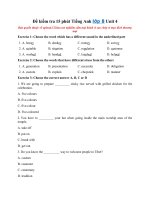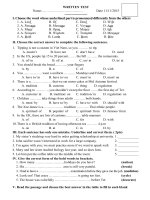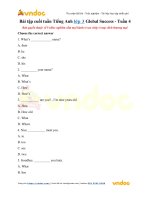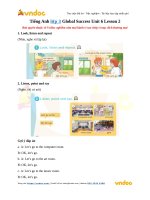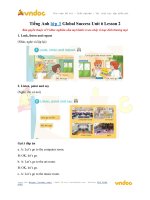TIẾNG ANH LỚP 8 GLOBAL SUCCESS Unit 4, 5, 6 exercises
Bạn đang xem bản rút gọn của tài liệu. Xem và tải ngay bản đầy đủ của tài liệu tại đây (115.27 KB, 6 trang )
Tiếng Anh Nguyễn Phúc Nguyện - 0328373125
UNIT 6: LIFESTYLES – EXERCISES
Ex 1. Match the words with its definitions.
Vocabulary
Definition
1. commom practice
2. tribal dance
3. greet
4. dogsled
Key
a. a series of movements and steps that are usually
performed to music by tribal groups
b. a vehicle that slides over snow pulled by dogs, used
especially in Canada and Alaska
c. to communicate with somebody, especially while you
work, play or spend time with them
d. the way in which a person or a group of people lives and
works
1…
2…
3…
4…
5. maintain
e. a person who drives a dog sled
5…
6. musher
f. the usual way of doing something
6…
7. interact
g. to keep, make something continue at the same level,
standard, etc.
7…
8. lifestyle
h. to say hello to somebody or to welcome them
8…
Ex 2. Complete the sentences with the words and phrases below.
title
native art
greet
street food
in the habit of
method
tribal dance
convenient
experience
carving
1. The gallery in the city centre has an excellent collection of …………………………………
2. Buying …………………………… is a common practice in my country.
3. Students call their teachers by their ……………………………, not by their name.
4. Many adults are ……………………………………… having breakfast outside their homes.
5. Handshaking, bowing, and hugging are some of the ways in which people ………………….
one another.
6. Riding bicycle is often more ……………………………………… than driving car in towns.
7. Alaska is also known for its unusual ……………………………… of transport - the dogsled.
8. Visitors to Alaska may …………………….. some of native people’s culture in their villages.
9. Native groups have their own special styles of …………………………… or weaving.
10. We can join in the ……………………………. when we attend the local festival.
Lớp 8 – Unit 6: Lifestyles – Page | 1
Tiếng Anh Nguyễn Phúc Nguyện - 0328373125
Ex 3. Circle the correct answer to complete the sentences.
1. If the weather is fine, we (goes/will go) camping tomorrow.
2. My parents will give me a gift if I (will pass/ pass) the final exam.
3. If you are polite to others, they (will be/ are) nice to you.
4. Unless James (studies/ will study) hard, he will fail the exam.
5. My parents won't allow me to go out if I (don't finish/ won't finish) my homework.
6. If the cable TV (doesn't/ won't) work, we will rent a DVD.
7. If you don't want to stay at home, you (go/ can go) with me to the supermarket.
8. If you (will be/ are) a good listener, you will gain many friends.
9. James won't attend the meeting if he (won't/doesn't) want to.
10. You can't have this job unless you (have/ will have) long working experience.
11. What (you will do/ will you do) if it snows tomorrow?
12. You (will be/ are) able to understand if you practice every day.
13. We will eat out today if there (will be/ is) nothing left in the fridge.
14. If it (will be/ is) too cold outside, we will stay home.
15. If she (isn't/ won't) careful, she will make many mistakes.
Ex 4. Read the following passage and mark the letter A, B, C or D to indicate the correct
answer to each of the questions.
Staying in hotels and resorts has been a traditional part of travel since the beginning of mass
tourism. But nowadays, many tourists want a more intimate experience. For this reason, they
are choosing to “go native”. This often means staying in the kinds of places that local people
inhabit. In big cities, you can try staying with the friend of a friend. You may end up sleeping
on the couch or floor, but the advantages outweigh the discomfort. The biggest plus is that
you'll be staying with a local and seeing the city from a local perspective.
Another option is house-swapping. Several websites allow you to connect with people who
want to trade living situations. It's usual to exchange emails about favourite places in the city
before the swap, meaning you can have a truly local experience. But of course, you can only do
this if you don't mind having strangers staying in your house.
For the more adventurous, staying in a native structure in an African village or a hut on the
water in Vietnam or Thailand can be a real thrill. These might not even include plumbing or
electricity, and that is part of the charm. The experience of dealing with oil lamps and carrying
water really gives you a sense of how the people live.
Lớp 8 – Unit 6: Lifestyles – Page | 2
Tiếng Anh Nguyễn Phúc Nguyện - 0328373125
No matter how unadventurous you feel, you might want to consider crossing hotels off your
list. Getting to know the local way of life is the most valuable part of travel. And what better
way is there to do this than staying where the local people actually live?
(Adapted from Solutions - Third Edition by Tim Filla and Paul A Davien)
Question 1. What is the passage mainly about?
A. New holiday accommodation trends
B. Adventurous holiday activities
C. World heritage sites
D. Main tourist attractions in Asia
Question 2. The word “they” in paragraph 1 refers to …
A. resorts
B. hotels
C. local people
D. tourists
Question 3. What is the biggest advantage of tourists' going native?
A. It enables them to experience the local lifestyle.
B. It offers them opportunities to make new friends.
C. It is more comfortable than staying in hotels and resorts.
D. It is cheaper than staying in other kinds of accommodation
Question 4. The word “charm” in paragraph 3 is closest in meaning to …
A. price
B. attraction
C. safet
D. danger
Question 5. Which of the following is mentioned in the passage?
A. There are several websites used for house-swapping purposes.
B. Tourists to Thailand prefer staying in a native structure to staying in a hut.
C. Staying with local people is more popular than staying in hotels and resorts.
D. Dealing with oil lamps is the most thrilling experience for tourists to Vietnam.
Lớp 8 – Unit 6: Lifestyles – Page | 3
Tiếng Anh Nguyễn Phúc Nguyện - 0328373125
Ex 5. Read and decide which statements are True or False.
The English countryside has a classic image. People imagine that life in the country is slow
and calm, that there are no traffic jams, no pollution, and no crime. In some places, this is true,
but in others it is not. Small towns and villages are becoming more and more popular, people
have more space and most houses have gardens. But problems are growing. Lots of people want
to live in the country and work in the city, so more and more people travel long distances each
day to go for work. Of course they don't use buses (they are too slow) or trains (they don't stop
in the country), they use their own cars. Although they live in the country, they want to use
supermarkets and good fast roads... but they do not want to see them or hear them. Besides, lots
of young people say that life in the country is boring because there is not enough to do, there
are not enough activities and excitements. Little villages now have traffic problems in the
morning, just like big cities! And they are getting worse.
1. People can enjoy fresh air, calmness and safety in most of the English countryside
T
F
2. Lots of people prefer living in the country because of the space and gardens
T
F
3. Those people living in the country use public transport to work
T
F
4. Traffic problems in the morning make little villages be like big cities
T
F
5. What is the best tittle of the passage?
A. the advantages of present-day rural areas
B. the traffic problems in small towns and villages
C. the modern conveniences in present-day countryside
D. Challenges facing rural life
6. The word “classic” in line 1 means …
A. classy
B. typical
C. traditional
D. peaceful
Lớp 8 – Unit 6: Lifestyles – Page | 4
Tiếng Anh Nguyễn Phúc Nguyện - 0328373125
Ex 4. Dịch bài đọc:
Ở trong khách sạn và khu nghỉ dưỡng là một nét truyền thống kể từ đầu kỳ nguyên du lịch đại
chúng. Thế nhưng ngày nay nhiều du khách muốn một trải nghiệm gần gũi hơn. Vì lý do này họ
chọn “loại hình du lịch bản địa". Điều này thường có nghĩa là ở tại nơi cư trú của người dân địa
phương. Trong các thành phố lớn, bạn có thể thử ở với bạn của một người bạn. Bạn có thể phải
ngủ trên ghế dài hoặc săn nhà, nhưng có nhiều ích lợi hơn sự khó chịu. Điểm cộng lớn nhất là
bạn sẽ ở với người dân địa phương và quan sát thành phổ từ góc nhìn của dân địa phương.
Một lựa chọn khác là hoán đổi nhà. Một số trang web cho phép bạn kết nối với những người
muốn hoán đổi hồn cảnh sống. Thường có trao đổi thư điện tử về những địa điểm yêu thích
trong thành phố trước khi đổi, có nghĩa là bạn có thể có trải nghiệm địa phương thực sự. Nhưng
dĩ nhiên bạn chỉ có thể làm vậy nếu khơng bận tâm đến việc có người lạ ở trong nhà bạn.
Phiêu lưu hơn, ở trong một kiến trúc bản địa thuộc một ngôi làng châu Phi hay một túp lều trên
mặt nước ở Việt Nam hay Thái Lan có thể là một chiêm nghiệm thực sự. Ở đó thậm chí khơng
có đường ống nước hay điện, và đó chính là điều làm nên sự hấp dẫn. Trải nghiệm với đèn dầu
và gánh nước thực sự giúp bạn cảm nhận cuộc sống của con người.
Bạn thấy thiếu phiêu lưu thể nào khơng quan trọng, bạn có thể muốn cân nhắc việc gạch các
khách sạn ra khỏi danh sách. Tim hiểu cuộc sống của người địa phương là phần đáng giá nhất
của chuyến du lịch. Còn cách nào để làm điều đó tốt hơn là ở tại chính nơi ở của người địa
phương?
Question 1. What is the passage mainly about?
A. New holiday accommodation trends
B. Adventurous holiday activities
C. World heritage sites
D. Main tourist attractions in Asia
Question 2. The word “they” in paragraph 1 refers to …
A. resorts
B. hotels
C. local people
D. tourists
Question 3. What is the biggest advantage of tourists' going native?
A. It enables them to experience the local lifestyle.
B. It offers them opportunities to make new friends.
C. It is more comfortable than staying in hotels and resorts.
Lớp 8 – Unit 6: Lifestyles – Page | 5
Tiếng Anh Nguyễn Phúc Nguyện - 0328373125
D. It is cheaper than staying in other kinds of accommodation
Question 4. The word “charm” in paragraph 3 is closest in meaning to …
A. price
B. attraction
C. safet
D. danger
Question 5. Which of the following is mentioned in the passage?
A. There are several websites used for house-swapping purposes.
B. Tourists to Thailand prefer staying in a native structure to staying in a hut.
C. Staying with local people is more popular than staying in hotels and resorts.
D. Dealing with oil lamps is the most thrilling experience for tourists to Vietnam.
Ex 5.
1F => Theo thơng tin dựa trên dịng thứ 5
2F => Theo thơng tin dựa trên dịng thứ 2,3
3T => Theo thơng tin dựa trên dịng thứ 16
4T => Theo thơng tin dựa trên dịng thứ 22
5D => Theo thơng tin cả bài suy ra đc
6C => Vì ta có từ classic(adj)= traditional(adj)-> truyền thống
Lớp 8 – Unit 6: Lifestyles – Page | 6

